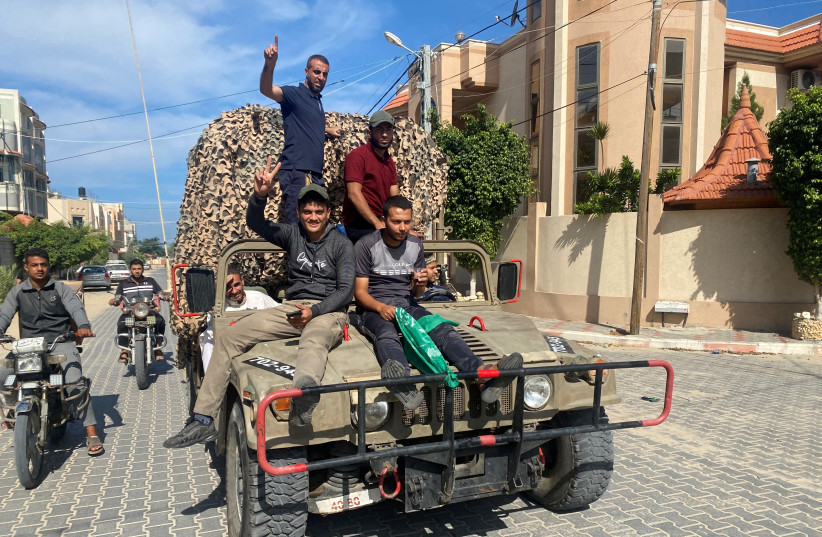Yoni Asher’s voice was steady but his urgency was unmistakable.
“I ask anyone coming to Efrat Katz’s home to tell me they are there, I have not heard from them for four hours,” he said on Israel’s government-run Kan radio.
“Them” for Asher was his mother-in-law, Efrat Katz, his wife, and his two daughters, aged three and five, whom he did not name. The last time he spoke to Katz, who lives in Nir Oz, a kibbutz near the Gaza border, she described seeing Palestinian terrorists lead away her husband, who is 79.
Since then, nothing. Asher said he logged on to his laptop to track his wife’s cell phone. He saw it pop up in Khan Yunis, a thickly populated town in Gaza’s south.
“I fear that she has been kidnapped,” he said and asked the anchorman if he could recite his own phone number so he could get information. “Of course,” the anchorman said, and Asher recited the number. “Again, slowly,” the anchorman said.

Seeking information from missing loved ones
Such calls interrupted the flow of news on Israel’s radio stations as families across the country sought information about loved ones near the Gaza border, where Hamas launched a surprise attack Saturday morning, unprecedented in its scope and deadly impact. The phrase “It’s chaos” was heard repeatedly from newsreaders, from families, and occasionally from people caught in the raids, whispering desperately into their phones.
Hamas fired thousands of rockets and sent infiltrators across the border starting at 7 a.m. on Saturday, the Jewish Sabbath and the holiday of Simchat Torah, a time when religious Jews celebrate the reading of the Torah and the secular join family for barbecues, picnics, and partying.
The attackers killed more than 100 Israelis and wounded close to 1,000, and the casualties were not yet fully counted. They invaded at least 14 villages and towns near the border.
Israel radio said “scores” of people were being held hostage by terrorists, although there was no official tally. Some were spirited back to the Gaza Strip. In some cases, Hamas terrorists had barricaded themselves inside homes in Israel and were holding people hostage.
The radio quoted eyewitness accounts of the horror of about 1,000 youths who were meeting for a nature party at Kibbutz Re’im. They scrambled as they were hit by incoming fire and then saw they were surrounded by armed terrorists who opened fire indiscriminately and tossed grenades into tents.
Some of the youths made it to their cars, only to be followed by the terrorists; one group of youths reported getting out of their car on the highway before seeing it totaled by an incoming missile moments later.
It was not clear yet how many people were killed at Kibbutz Re’im and how many were missing.
“People woke up to the sound of explosions and guns near our tents, it was utter chaos, people were not completely aware because of what they had consumed” the night before, one survivor said on Israel radio.
“Some people got away [in their vehicles] others fled into the orchards, some people climbed into trees to avoid the gunfire,” said the survivor. “A group of 50 people were knocked to the ground by shock grenades and then they opened fire on them. I think 12 survived.”
He described watching Hamas terrorists dragging bodies away.
Israeli reservists turned up for duty, some of them well beyond the age Israel asks its soldiers to volunteer. Among them is former prime minister Naftali Bennett, who is 51.
Officials told civilians in the South entering their sealed rooms to make sure the steel doors were securely shut. The Kan broadcaster reached one woman inside a sealed room who tried to describe her situation but stopped to gasp when she heard a noise. She then hung up.
Others told of relatives waiting for nine hours to be rescued.
A relative described a family caught in a sealed room on the edge of Kefar Aza who could hear terrorists inside their house. One man said he had spoken with his uncle in a border village – a terrorist had tossed a grenade inside the house, and his uncle returned fire, killing the terrorist. The family retreated into a sealed room and were awaiting rescue; a small girl sustained a head injury from the grenade attack.
An Israel radio reporter described an interview he had with a wounded man at Soroka Hospital near Beersheba. The man reported that he was traveling with his wife and child when he saw a group of about 15 riders on motorbikes, whom he assumed were enthusiasts on an outing. They pulled alongside him and opened fire and his wife died immediately. He fled the vehicle, clutching his child.
One woman wept as she asked for information about her daughter, Roni Gonen, and her friend, Gaya Halifa, who were attending the party at Kibbutz Re’im. The last time she heard from her she could tell she was in a car. There were male voices speaking Arabic.
